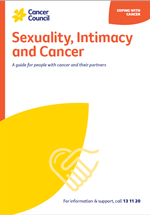- Home
- Prostate cancer
- Managing side effects
- Ways to improve erections
Ways to improve erections
There are several medical options to try to improve the quality of your erections, no matter what type of prostate cancer treatment you have had. Ask your treatment team for more details about these methods and other things you can do to improve erections.
TabletsYour doctor can prescribe tablets to increase blood flow to the penis. These only help if the nerves controlling erections are working. These tablets should not be taken with certain blood pressure medicines. Check with your doctor about the medicines you take.Your doctor may recommend using the tablets before and soon after surgery, as the increased blood flow can help preserve penis health until the nerves recover. Tablets are also an option after radiation therapy and ADT. | |
Vacuum erection device (VED)A vacuum erection device (VED) or “penis pump” uses suction to make blood flow into the penis. This device can also help to strengthen or maintain a natural erection. Talk to your doctor about suitable devices for you and where to buy them.You place a clear, rigid tube over the penis. A manual or battery-operated pump then creates a vacuum that causes blood to flow into the penis so it gets hard. You place a rubber ring at the base of the penis to keep the erection firm for intercourse after the pump is removed. The ring can be worn comfortably for 30 minutes. | |
Penile injection therapy (PIT)Penile injection therapy (PIT) involves injecting the penis with medicine that makes blood vessels in the penis expand and fill with blood, creating an erection. This usually occurs within 15 minutes and lasts for 30–60 minutes.The medicine has to be prescribed by a doctor. It often comes in pre-loaded syringes, which are single use. You can also buy it in vials from a compounding pharmacy and measure it out into a syringe yourself. You will be taught how to inject the penis. Injecting your penis may sound unpleasant, but many people say it causes only a moment of discomfort. PIT works well for many people, but a few may have pain and scarring. A rare side effect is a prolonged and painful erection (priapism). This needs emergency medical attention. | |
ImplantsA penile prosthesis is a permanent implant that allows you to create an erection. Flexible rods or thin, inflatable cylinders are placed in the penis during surgery and connected to a pump in the scrotum. You turn on or squeeze the pump when you want an erection.An implant is not usually recommended for at least a year after prostate cancer treatment, and non-surgical options such as oral medicines or injections will usually be tried first. Occasionally, penile implants need to be removed. If this happens, you will no longer be able to have an erection. |
You may see or hear ads for ways to treat erection problems. These ads may be for herbal preparations, natural therapies, nasal sprays and lozenges. If you are thinking about using these products, talk to your doctor first, as there could be risks without any benefits. Products that contain testosterone or act like testosterone in the body may encourage some cancers to grow.
Podcast: Sex and Cancer
Listen to more of our podcast for people affected by cancer
More resources
Prof Declan Murphy, Consultant Urologist, Director – Genitourinary Oncology, Peter MacCallum Cancer Centre and The University of Melbourne, VIC; Alan Barlee, Consumer; Dr Patrick Bowden, Radiation Oncologist, Epworth Hospital, Richmond, VIC; Bob Carnaby, Consumer; Dr Megan Crumbaker, Medical Oncologist, St Vincent’s Hospital Sydney, NSW; Henry McGregor, Health Physiotherapist, Adelaide Men’s Health Physio, SA; Jessica Medd, Senior Clinical Psychologist, Department of Urology, Concord Repatriation General Hospital and Headway Health, NSW; Dr Gary Morrison, Shine a Light (LGBTQIA+ Cancer Support Group); Caitriona Nienaber, 13 11 20 Consultant, Cancer Council WA; Graham Rees, Consumer; Kerry Santoro, Prostate Cancer Specialist Nurse Consultant, Southern Adelaide Local Health Network, SA; Prof Phillip Stricker, Chairman, Department of Urology, St Vincent’s Private Hospital, NSW; Dr Sylvia van Dyk, Brachytherapy Lead, Peter MacCallum Cancer Centre, VIC.
View the Cancer Council NSW editorial policy.
View all publications or call 13 11 20 for free printed copies.

